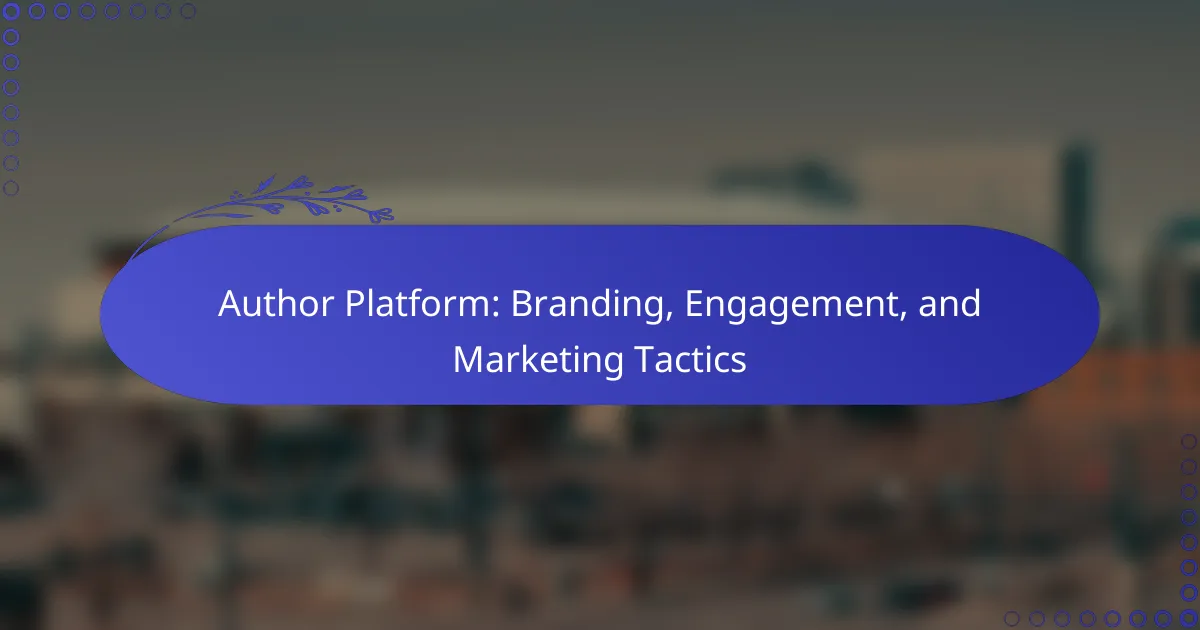Creating a successful author platform requires a well-defined brand that connects with your audience and showcases your unique writing style. By implementing effective engagement and marketing tactics, such as virtual events and targeted online strategies, you can enhance your visibility and foster reader loyalty in a competitive literary landscape.

How to Build an Author Brand?
Building an author brand involves establishing a distinct identity that resonates with your target audience and reflects your writing style. A strong author brand enhances visibility, fosters reader loyalty, and creates opportunities for engagement and marketing.
Define your unique voice
Your unique voice is the essence of your author brand. It encompasses your writing style, tone, and perspective, distinguishing you from other authors. To define it, consider what themes you are passionate about and how you want to convey your message.
Reflect on your personal experiences and viewpoints, as these will shape your voice. Experiment with different styles and solicit feedback from trusted peers to refine your approach.
Create a professional website
A professional website serves as the central hub for your author brand. It should include a bio, links to your works, a blog or news section, and contact information. Aim for a clean, user-friendly design that reflects your style and makes it easy for visitors to navigate.
Consider integrating a mailing list sign-up to capture visitor information. This allows you to communicate directly with your audience about new releases and events, enhancing engagement.
Utilize social media platforms
Social media platforms are powerful tools for building your author brand and connecting with readers. Choose platforms that align with your audience, such as Instagram for visual storytelling or Twitter for quick updates and interactions.
Regularly share content that reflects your brand, including writing tips, personal anecdotes, or insights into your creative process. Engage with followers by responding to comments and participating in relevant discussions.
Engage with your audience
Engaging with your audience is crucial for building a loyal reader base. Host events like book signings, readings, or virtual Q&A sessions to foster direct connections. Encourage feedback and discussions about your work to create a sense of community.
Consider creating exclusive content for your audience, such as behind-the-scenes looks at your writing process or early access to new material. This can deepen their investment in your brand.
Leverage author branding tools
Utilizing author branding tools can streamline your marketing efforts and enhance your visibility. Tools like Canva can help you create professional graphics for social media, while platforms like Mailchimp can manage your email campaigns.
Explore analytics tools to track engagement and understand your audience better. This data can inform your marketing strategies and help you adjust your approach to meet reader preferences effectively.

What Engagement Strategies Work for Authors?
Effective engagement strategies for authors include hosting virtual events, participating in online discussions, utilizing email newsletters, and collaborating with fellow writers. These methods help build a loyal readership and enhance visibility in a competitive market.
Host virtual book readings
Hosting virtual book readings allows authors to connect directly with their audience in real-time. Platforms like Zoom or Facebook Live enable authors to showcase their work, read excerpts, and interact with viewers through Q&A sessions.
Consider scheduling these events at convenient times for your target audience, such as evenings or weekends. Promote the readings through social media and email to maximize attendance and engagement.
Participate in online forums
Engaging in online forums related to your genre or interests can significantly enhance your visibility as an author. Websites like Goodreads or specialized Facebook groups provide platforms for discussion, feedback, and networking.
Contribute valuable insights and answer questions to establish yourself as an authority. Avoid overt self-promotion; instead, focus on building relationships and sharing your expertise.
Use email newsletters
Email newsletters are a powerful tool for maintaining contact with your readers. Regular updates about your writing progress, upcoming events, and exclusive content can keep your audience engaged and informed.
Consider segmenting your email list to tailor content to different reader interests. Aim for a consistent schedule, such as monthly or bi-monthly, to keep your readers looking forward to your updates.
Collaborate with other authors
Collaborating with other authors can expand your reach and introduce you to new audiences. Joint projects, such as anthologies or co-hosted events, can create buzz and attract attention from both authors’ fan bases.
When collaborating, choose authors whose work complements yours to ensure a cohesive project. Promote the collaboration through all available channels to maximize exposure and engagement.

How to Market Your Books Effectively?
To market your books effectively, focus on targeted strategies that enhance visibility and engage your audience. This involves a mix of online advertising, search engine optimization, content marketing, and participating in relevant events.
Utilize Amazon Advertising
Amazon Advertising allows authors to promote their books directly on the platform where many readers shop. By using Sponsored Products or Sponsored Brands, you can increase your book’s visibility to potential buyers who are already interested in similar genres.
Consider setting a budget that aligns with your sales goals. Aiming for a cost-per-click (CPC) of around $0.50 to $1.00 can be effective, but monitor your campaigns closely to adjust bids based on performance.
Implement SEO strategies
Search Engine Optimization (SEO) is crucial for increasing your book’s discoverability online. Start by researching keywords relevant to your book’s genre and themes, then incorporate these into your book description, author bio, and blog posts.
Utilize tools like Google Keyword Planner to find popular search terms. Aim for a keyword density of about 1-2% in your content, ensuring it reads naturally while still being optimized for search engines.
Engage in content marketing
Content marketing involves creating valuable content that attracts and retains readers. This could include blog posts, podcasts, or videos related to your book’s themes, which help establish your authority and engage your audience.
Consider offering free chapters or short stories as downloadable content to entice readers. Regularly updating your blog with relevant topics can also enhance your online presence and drive traffic to your book listings.
Participate in book fairs
Book fairs provide an excellent opportunity to connect with readers and other authors. Participating in local or national events allows you to showcase your work, network, and gain insights into market trends.
Prepare promotional materials, such as bookmarks or flyers, to distribute at these events. Engaging with attendees through readings or Q&A sessions can also create a memorable experience that encourages book sales.

What Are the Key Metrics for Author Success?
Key metrics for author success include book sales, website traffic, and social media engagement. These indicators help authors gauge their reach, effectiveness in marketing, and overall impact on their audience.
Track book sales
Tracking book sales is crucial for understanding an author’s market performance. This involves monitoring sales across various platforms, including online retailers and local bookstores. Authors should regularly check sales reports, which can vary significantly depending on the format (e.g., print, eBook) and distribution channels.
Consider setting specific sales goals, such as aiming for a certain number of copies sold in the first month after release. Using tools like Amazon Author Central can provide valuable insights into sales trends and rankings.
Analyze website traffic
Analyzing website traffic helps authors understand how effectively they are attracting visitors to their online presence. Tools like Google Analytics can provide data on visitor numbers, page views, and user behavior. Authors should focus on metrics such as unique visitors and average session duration to gauge engagement.
It’s beneficial to track traffic sources to see where visitors are coming from, whether through social media, search engines, or referrals. This information can guide marketing strategies and content creation to improve traffic over time.
Monitor social media engagement
Monitoring social media engagement is essential for assessing how well an author connects with their audience. Key metrics include likes, shares, comments, and follower growth across platforms like Facebook, Twitter, and Instagram. Engaging content can lead to higher interaction rates, which can boost visibility.
Authors should aim to post consistently and interact with followers to foster a community. Tools like Hootsuite or Buffer can help manage posts and analyze engagement metrics effectively. Regularly reviewing these metrics can inform future content strategies and promotional efforts.

What Tools Can Enhance Author Marketing?
Several tools can significantly improve author marketing by streamlining graphics creation, email campaigns, and social media management. Utilizing these platforms effectively can enhance your visibility and engagement with readers.
Canva for graphics
Canva is a user-friendly design tool that allows authors to create professional-quality graphics without needing extensive design skills. You can use it to develop book covers, social media posts, and promotional materials quickly.
Consider using Canva’s templates for consistency in branding. For example, you can create a series of posts that share quotes from your book, using the same color scheme and typography to reinforce your identity.
Don’t overlook the importance of high-quality visuals; they can increase engagement rates on social media by up to 80%. Always ensure your graphics are optimized for the platforms you are using.
Mailchimp for email campaigns
Mailchimp is a powerful email marketing platform that helps authors manage their mailing lists and send targeted campaigns. It offers automation features that allow you to schedule emails, segment your audience, and track engagement metrics.
Start by creating a welcome series for new subscribers, which can include a personal introduction and exclusive content. Aim for a consistent sending schedule, such as monthly newsletters, to keep your audience engaged.
Be cautious with your email frequency; too many emails can lead to unsubscribes. A good rule of thumb is to send no more than two emails per month unless you have special announcements.
Hootsuite for social media management
Hootsuite is a comprehensive social media management tool that enables authors to schedule posts, monitor engagement, and analyze performance across multiple platforms. This can save you time and ensure a consistent online presence.
Utilize Hootsuite’s analytics to determine which types of content resonate most with your audience. For instance, you might find that posts featuring behind-the-scenes content generate more engagement than promotional posts.
Remember to engage with your audience by responding to comments and messages promptly. This interaction can foster a loyal community around your work and enhance your author brand.
